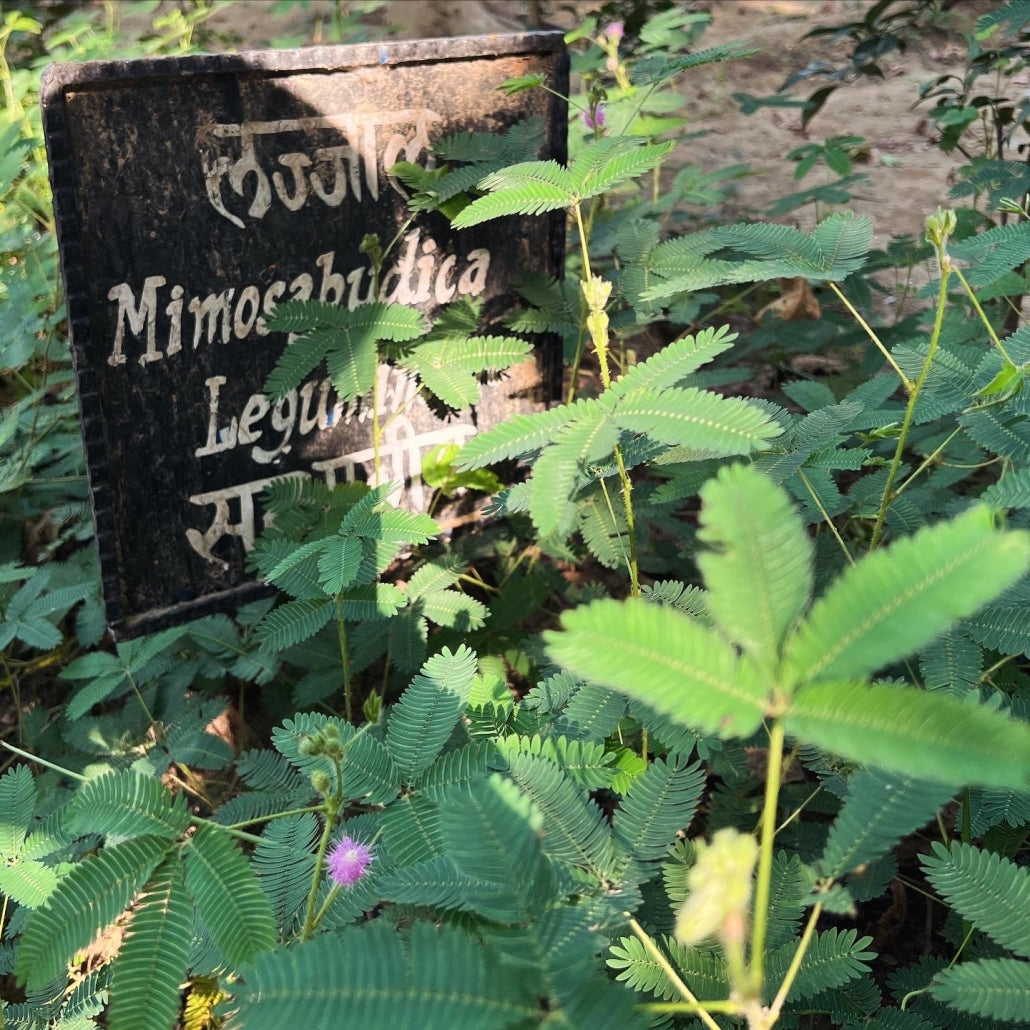Have you heard of Mimosa Pudica?
January 23, 2024 2 min read

Have you heard of Mimosa Pudica also commonly known as the sensitive plant or touch me not, it is known for its unique ability to fold its leaves in response to touch or another stimuli. (Watch the video in our IG stories to see this).
This Ayurvedic plant can be found in tropical America, Asia and the Australian East Coast.
The medicinal use of the plant dates back to Charaka and Sushruta Samhita. Numerous properties of the plant are mentioned such as:
Raktapittahara – alleviates bleeding disorders
Sophahara – reduces oedema
Yonirogahara – treats vaginal disease (used in uterine prolapse)
Atisaraghna – antidiarrhoeal
Kusthahara – beneficial in skin disease
Shwasa – chronic respiratory disorder
Ayurvedic properties of Lajjalu (Mimosa pudica)
Rasa/ taste: bitter and astringent
Vipaka/ post digestive taste: heating
Karma: alleviates Kapha and Pitta
Virya/ potency: cold
Guna/ qualities: light and dry
In Ayurvedic medicine, Lajjalu (Mimosa pudica) has various uses:
1. Wound Healing and Antimicrobial:
It has wound-healing properties and can be used topically for cuts and wounds and manage infections. The whole plant can be used for this.
2. Anti-inflammatory:
Lajjalu possess anti-inflammatory effects and may be used to alleviate inflammation in certain conditions.
It is also an ingredient of Visgarbha thailam an Ayurvedic oil for painful joints.
3. Anti diarrhoeal:
It is stool binding in nature. Used in the treatment of prolapsed rectum Guda Bhramsha)
4. Bleeding disease:
It is traditionally used in heavy menstrual bleeding, bleeding piles and bleeding disorders.
Some more facts
The paste of the roots can be applied on piles.
The juice of the leaves are useful in vaginal disease including uterine prolapse
The decoction of the root is given in dysentery and urinary calculi
The powder of the leaves is given with milk in the treatment of piles
Keep your eyes open for this beautiful Ayurvedic plant especially if you are on a holiday in Bali.
Let us know if you would like to learn more about Dravyaguna (Ayurvedic Pharmacology).
Comment below if you come across this special plant.
We wish you a healthy start to the New Year. ♥️
With Love, Karin and the Lakshmi team
* 𝘗𝘭𝘦𝘢𝘴𝘦 𝘯𝘰𝘵𝘦 𝘵𝘩𝘢𝘵 𝘵𝘩𝘦𝘴𝘦 𝘤𝘭𝘢𝘪𝘮𝘴 𝘩𝘢𝘷𝘦 𝘯𝘰𝘵 𝘣𝘦𝘦𝘯 𝘢𝘱𝘱𝘳𝘰𝘷𝘦𝘥 𝘣𝘺 𝘵𝘩𝘦 𝘛𝘎𝘈. 𝘛𝘩𝘦 𝘪𝘯𝘧𝘰𝘳𝘮𝘢𝘵𝘪𝘰𝘯 𝘱𝘳𝘰𝘷𝘪𝘥𝘦𝘥 𝘪𝘴 𝘯𝘰𝘵 𝘮𝘦𝘢𝘯𝘵 𝘵𝘰 𝘣𝘦𝘶𝘴𝘦𝘥 𝘵𝘰 𝘥𝘪𝘢𝘨𝘯𝘰𝘴𝘦 𝘰𝘳 𝘵𝘳𝘦𝘢𝘵 𝘢𝘯𝘺𝘰𝘯𝘦 𝘢𝘯𝘥 𝘴𝘩𝘰𝘶𝘭𝘥 𝘯𝘰𝘵 𝘣𝘦 𝘵𝘢𝘬𝘦𝘯 𝘸𝘪𝘵𝘩𝘰𝘶𝘵 𝘤𝘰𝘯𝘴𝘶𝘭𝘵𝘢𝘵𝘪𝘰𝘯 𝘸𝘪𝘵𝘩 𝘢𝘯 𝘈𝘺𝘶𝘳𝘷𝘦𝘥𝘪𝘤 𝘱𝘩𝘺𝘴𝘪𝘤𝘪𝘢𝘯. 𝘞𝘦𝘥𝘰 𝘯𝘰𝘵 𝘨𝘶𝘢𝘳𝘢𝘯𝘵𝘦𝘦 𝘢𝘯𝘥 𝘢𝘴𝘴𝘶𝘮𝘦 𝘯𝘰 𝘭𝘦𝘨𝘢𝘭 𝘭𝘪𝘢𝘣𝘪𝘭𝘪𝘵𝘺 𝘰𝘳 𝘳𝘦𝘴𝘱𝘰𝘯𝘴𝘪𝘣𝘭𝘺 𝘧𝘰𝘳 𝘵𝘩𝘦 𝘢𝘤𝘤𝘶𝘳𝘢𝘤𝘺, 𝘤𝘶𝘳𝘳𝘦𝘯𝘤𝘺 𝘰𝘳 𝘤𝘰𝘮𝘱𝘭𝘦𝘵𝘦𝘯𝘦𝘴𝘴 𝘰𝘧𝘪𝘯𝘧𝘰𝘳𝘮𝘢𝘵𝘪𝘰𝘯 𝘤𝘰𝘯𝘵𝘢𝘪𝘯𝘦𝘥 𝘪𝘯 𝘵𝘩𝘦𝘴𝘦 𝘮𝘢𝘵𝘦𝘳𝘪𝘢𝘭𝘴.
Subscribe
Sign up to get the latest on sales, new releases and more …

